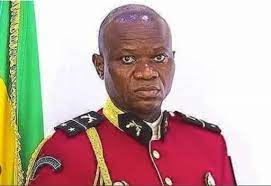The leader of Gabon’s recent military coup, Brice Nguema, pledges a return to civilian rule through transparent elections. However, no specific election date has been announced. The coup, which removed President Ali Bongo, garnered mixed reactions from the public, with some hopeful for change while others see it as a continuation of the Bongo dynasty. The new leader’s ties to the Bongo family raise questions about the extent of change he will bring. The inauguration is marked by military parades and the presence of ousted government officials. This event adds to a trend of military takeovers in the region, prompting concerns over French influence and international condemnation.
 by Fatima Abass
by Fatima Abass
Amidst a climate of anticipation and uncertainty, the leader of Gabon’s military junta, Brice Nguema, has pledged a path back to democratic governance, emphasizing the importance of “free and transparent” elections. Yet, the crucial detail of when these elections will take place remains conspicuously absent from his address.
Brice Nguema assumed the role of interim president following his role in orchestrating last week’s coup, a swift and dramatic move that saw the ousting of Ali Bongo, who had just been declared the winner of a contested election. The coup, met with both celebration and skepticism, has left the nation divided over the potential for meaningful change.
The day of Nguema’s inauguration was marked by a jubilant atmosphere as crowds of cheering civilians gathered to witness the occasion. For many, the coup symbolized hope for a fresh beginning after years under the Bongo dynasty’s influence. However, some are cautious, suggesting that Nguema’s leadership might merely extend the Bongo legacy.
The Bongo family’s extensive political dominance spans generations. Ali Bongo’s father, Omar, controlled Gabon for over four decades before his passing in 2009, at which point his son succeeded him. Notably, Brice Nguema’s career has been closely intertwined with the Bongo family’s inner circle, with some sources even suggesting a familial connection through being Ali Bongo’s cousin.
The inauguration, held at the presidential palace in the capital city of Libreville, featured a military parade showcasing the junta’s strength. In a curious turn of events, former ministers from the deposed government also made an appearance, only to be met with boos from a contingent of junta supporters.
This junta-led transition is part of a broader trend of military interventions across West and Central Africa. Gabon joins a growing list of Francophone nations that have experienced military takeovers within the past three years. As these events unfold, questions arise regarding France’s influence in the region, given its historical colonial connections.
The international response to the coup has been swift and stern. Gabon’s suspension from the African Union followed closely after the upheaval, and condemnation has been voiced by both the United Nations and France, the former colonial power. The extent to which Gabon can navigate these challenges and steer towards a more stable democratic future remains to be seen.
